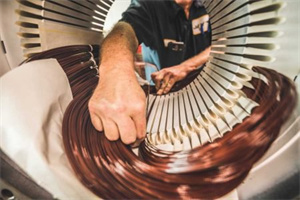The Backbone of Power Generation: The Importance of Wire for Generators
2024-03-07
In the realm of power generation, there are many essential components that work together to ensure a steady and reliable flow of electricity. While generators are often the stars of the show, there is one unsung hero that plays a crucial role in their operation: wire. The humble wire may not get the attention it deserves, but without it, generators would be rendered useless. In this blog post, we will explore the significance of wire for generators, shedding light on its key functions and highlighting the importance of selecting the right type of wire for optimal performance.
Conductivity and Current Carrying Capacity:
Wire serves as the conduit through which electrical current flows within a generator. It is responsible for carrying electricity from the generator's output terminals to the electrical load. The conductivity of the wire is a critical factor, as it directly affects the efficiency and overall performance of the generator. Copper is the most commonly used material for generator wire due to its excellent conductivity. Copper wires minimize resistance and power loss during transmission, ensuring efficient power transfer and reducing heat buildup.
Size and Gauge Selection:
The size and gauge of the wire used in generators are vital considerations. The gauge refers to the wire's diameter, and it determines the maximum amount of current the wire can safely carry. Choosing the appropriate wire size and gauge is crucial to prevent overheating and potential damage to the generator or connected devices. Undersized wires may result in voltage drops, decreased efficiency, and even equipment failure. It is essential to consult electrical codes and guidelines to determine the correct wire size based on the generator's capacity and the intended load.
Insulation and Safety:
Generators often operate in demanding environments, including outdoor settings or areas exposed to moisture, heat, or chemicals. Wire insulation plays a vital role in protecting against electrical hazards and ensuring the safety of both the generator and its operators. Insulated wires prevent current leakage, short circuits, and potential shocks. Selecting wire with insulation suitable for the operating conditions is crucial to maintain the generator's integrity and prevent accidents.
Durability and Longevity:
Generators are designed to provide reliable power for extended periods, and the wire used within them must be able to withstand the rigors of continuous operation. High-quality wire with proper insulation and resistance to environmental factors such as temperature, moisture, and abrasion will ensure the longevity and durability of a generator. Investing in quality wire may seem like an additional expense initially, but it pays off in the long run by reducing maintenance costs and minimizing downtime.
Compliance with Regulations:
Electrical systems, including generators, must meet specific safety standards and regulations laid out by regulatory bodies. Compliance with these regulations is essential to ensure the safety of personnel and property. The type of wire used in generators must adhere to the relevant codes and standards governing electrical installations. Using approved wire not only guarantees compliance but also provides peace of mind that the generator is operating within the necessary guidelines.
Conclusion:
While often overlooked, wire is an indispensable component in the world of power generation. Its conductivity, size, insulation, durability, and compliance with regulations all contribute to the efficient and safe operation of generators. Choosing the right wire and ensuring its proper installation is crucial for optimal performance, reliability, and longevity of generators. By recognizing the importance of wire, we can appreciate the critical role it plays in powering our homes, businesses, and industries.
